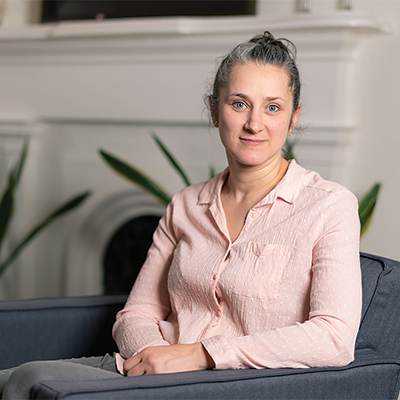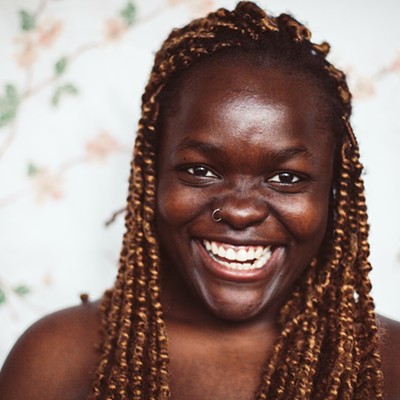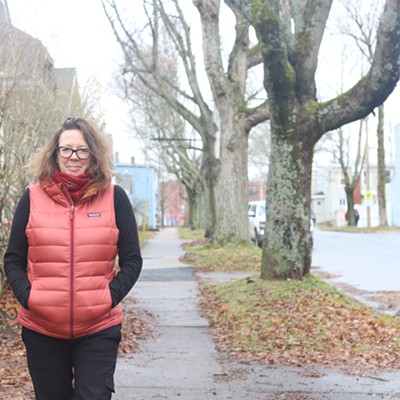Jenner-Brooke Berger took a creative writing class "on a whim" a couple years ago through Dalhousie's creative writing program, and while garnering attention as a runner-up in The Coast's postcard fiction contest and writing for its Holiday Fiction issue, she started working for Invisible Publishing and created a reading series out of her house. Ben Stephenson, another author who found his way through the creative writing program, says he began writing a novel "almost as a joke at first," but now can't seem to detach himself from his characters. Andrew Abraham slammed his way to the national championships with Halifax's slam poetry team in 2007 and 2008, and works with Leave Out ViolencE, a group that runs media arts training for youth. These three 23-year-olds are ready to take on the world---of writing, publishing and spoken word.
Looking at the local community, I'm wondering what your own writing dreams are, and what your hopes are for the local scene.
Jenner-Brooke Berger: For me personally, I always feel so good every time I do a reading. Reading aloud I find is really different doing it but also hearing it, and also just to have the immediate affirmation is so great. So more opportunities to read, I think. Also I find that the creative writing program at Dal is still quite small, and I'd like to see that get bigger. I feel like that would help out a lot of people. And even if that was just known as a good creative writing program it would draw more people.
But what I also think would be good for the community would be more authors coming in to do readings. I feel like the Word on the Street festival is kind of getting into that direction and making some changes, but I feel like there are kind of sexy authors, whose work is provocative or exciting and contemporary---more people like that, that just can get people more excited.
Ben Stephenson: I think what is cool about writing that I didn't realize at first, kind of what Jenner was saying about giving readings, I like that a lot because it's a performance space, a performance that you do that's a lot easier than a lot of other things such as giving an interview or being in a band. . .
Berger: Or even editing, which sucks.
Stephenson: Yeah. I'm really bad under pressure, so being a writer it's nice to be able to express on your own schedule. But really, I just want to get really good at writing stories. And learn how to tell any kind of story. I feel pretty satisfied with the Halifax scene right now, honestly. I feel like once you meet a couple people in the scene here, you just suddenly at least feel like you know everyone, even if you don't. And everyone I've met has been really supportive.
Andrew Abraham: I think with slam poetry, where it's competitive, and as much as there's kind of this principle about it being poetry, and not about the points, it's still competitive art, which is a little absurd.
Absurd in what way?
Abraham: Absurd in the sense that---and don't write this down---but in the sense that bowling with babies is absurd. It's crazy. I just think that competitive art, in some ways it's a less dangerous kind of aesthetic, or an oppressive use of aesthetics. But I think it draws audiences, which is kind of cool, but it doesn't really facilitate actual appreciation of real listening.
Stephenson: Do you find it more motivating to write, knowing that you're writing to compete?
Abraham: I don't. I like to write just whenever I write. I like to write because I have to, I have to for myself. So for my writing, I'd like to do that more. And stepping away from the slam scene is really nice, because it gives time to really write a lot of stuff that is just written for me, written the way it needs to be written, it comes out the way it's supposed to come out and all of that stuff. So I think that'd be nice, to not be influenced by worrying about scores and stuff like that. I want to honour the slam scene at the same time because it's given a lot to me. I guess I'd like to find balance there, between slamming and not slamming.
And then for the scene...when I'm working with young people, their thoughts and writings aren't any less profound than any of the thoughts and writings that I hear in open mics, which are usually in venues that are over 19 because they're licensed. I'd like to see more opportunities for young people to get their thoughts out there, and get their artwork out there, and more opportunity for their writings and however they express themselves to be considered artful, for it to be considered legitimate, real art.
What do you think can be done to foster this shift to a younger scene that you're hoping for?
Abraham: I think it's ultimately up to people like me. So I need to step my game up a little bit and try to create those opportunities. I'd say one thing that I find, just where a lot of the people I'm around day to day who are writing and performing spoken word, a lot of it revolves around black political thought. I have friends who've cleared bars because of the stuff that they've said. The Word Iz Bond scene is really good, but I find that sometimes that's not as acceptable, depending on where you go. I'd like to see that change.
Is Halifax somewhere where it's possible for you to stay as a writer?
Berger: It's hard for me to think long-term. I'm planning on staying and there's some things I have my hands in that I'd really like to continue involvement with, and I also really like writing in Halifax. I feel like this is where I got back into writing, or basically this city is where I found the audacity to believe I could be a writer.
Stephenson: I think it could. I think about leaving a lot, but when I really think about it I realize that everything that I've written that's any good has been written while I was in Halifax.
And I did live on the west coast in the middle of writing this book, for maybe eight months, and during that time I barely wrote anything because I just felt, well I just didn't think about it as much and I felt less at home.
I'm from New Brunswick, so I'm not actually from Halifax but still, being here, I don't know. It's like some kind of comfort, and maybe the terrible winters afford a lot of terrible emotions that fuel a lot of writing. So I think it would be really possible for me to stay here and keep doing what I'm doing, but I'm not sure what will happen.
Abraham: I was just wondering if it was warmer, what percentage of writers would just drop off?
Stephenson: I think I'd rather be warm than well-written any day. [All laugh.]
Berger: I feel in the summer is where you need to do your living. You do your research in the summer then, in the winter, you can't do anything else so you write about it.














